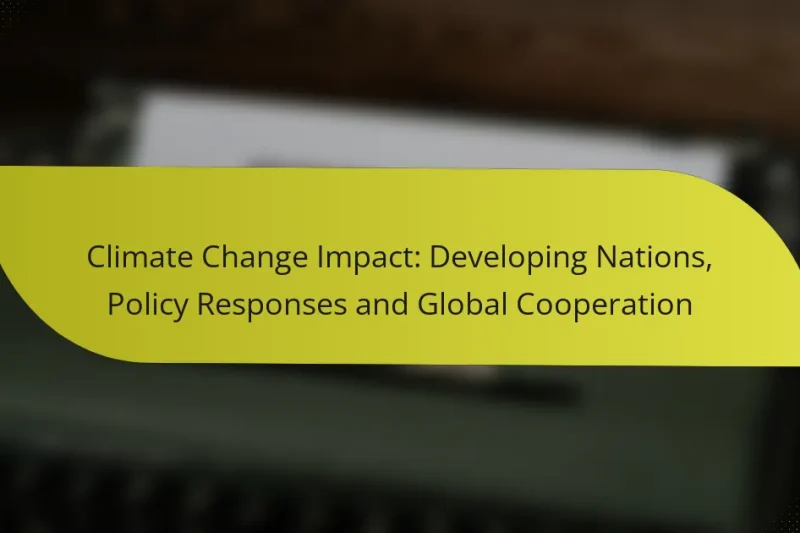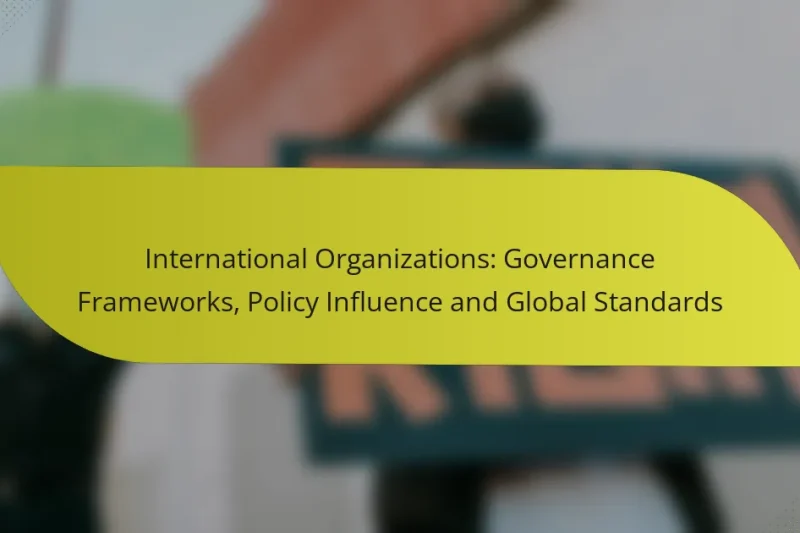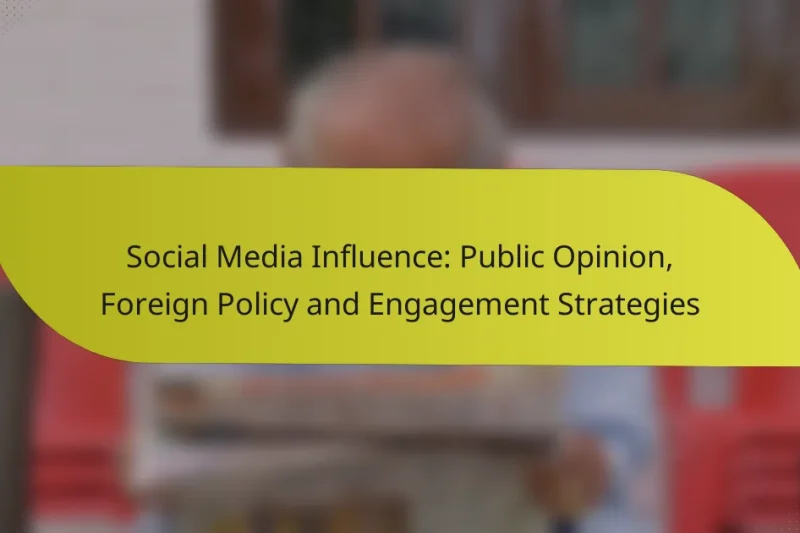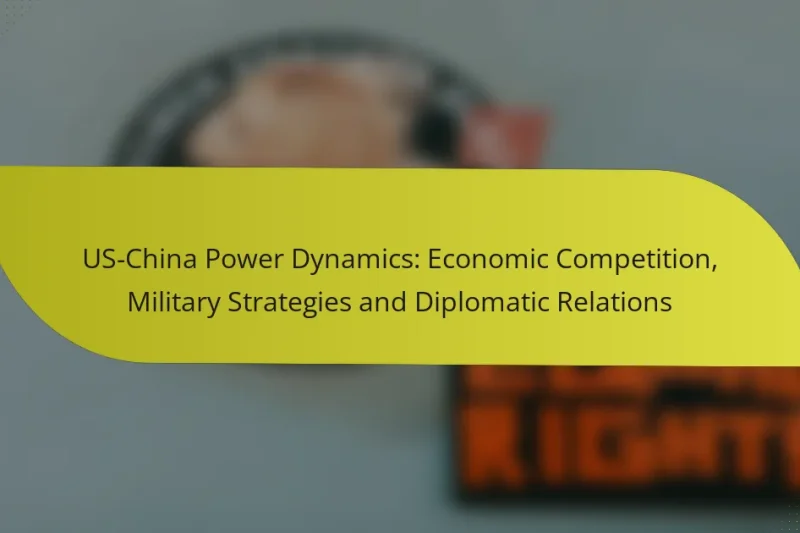In today’s interconnected world, technology plays a pivotal role in shaping digital diplomacy by enabling swift … Technology’s Role: Digital Diplomacy, Communication Tools and CybersecurityRead more
Key Trends in International Affairs
In 2024, key trends in international affairs will be defined by shifting geopolitical landscapes, the urgent effects of climate change, and the emergence of digital diplomacy. As nations navigate these complexities, a renewed emphasis on human rights and strategies for global economic recovery will play crucial roles in shaping diplomatic relations and policy-making. The interplay of globalization and technological advancements further complicates the evolving dynamics of international relations.
Climate Change Impact: Developing Nations, Policy Responses and Global Cooperation
Climate change poses a significant threat to developing nations, amplifying environmental hazards, jeopardizing food security, and … Climate Change Impact: Developing Nations, Policy Responses and Global CooperationRead more
International Conflict Resolution: Strategies, Mediation Techniques and Peacebuilding Efforts
International conflict resolution encompasses a range of strategies, including negotiation, mediation, and collaboration, aimed at addressing … International Conflict Resolution: Strategies, Mediation Techniques and Peacebuilding EffortsRead more
Emerging Geopolitical Trends: Trade Policies, Economic Alliances and Supply Chains
Emerging geopolitical trends are reshaping global trade policies, economic alliances, and supply chains. As nations prioritize … Emerging Geopolitical Trends: Trade Policies, Economic Alliances and Supply ChainsRead more
International Organizations: Governance Frameworks, Policy Influence and Global Standards
International organizations play a crucial role in shaping global governance by creating frameworks that guide policy-making … International Organizations: Governance Frameworks, Policy Influence and Global StandardsRead more
Social Media Influence: Public Opinion, Foreign Policy and Engagement Strategies
Social media plays a crucial role in shaping public opinion and influencing political outcomes by enabling … Social Media Influence: Public Opinion, Foreign Policy and Engagement StrategiesRead more
US-China Power Dynamics: Economic Competition, Military Strategies and Diplomatic Relations
The power dynamics between the US and China are characterized by intense economic competition, military strategies, … US-China Power Dynamics: Economic Competition, Military Strategies and Diplomatic RelationsRead more
What are the key trends in international affairs for 2024?
In 2024, key trends in international affairs will revolve around shifting geopolitical landscapes, the pressing impacts of climate change, the rise of digital diplomacy, a renewed focus on human rights, and strategies for global economic recovery. These trends will shape diplomatic relations and policy-making across nations.
Geopolitical shifts in Asia
Geopolitical dynamics in Asia are evolving, with significant power shifts among major players like China, India, and Japan. The ongoing competition for influence in the Indo-Pacific region is intensifying, particularly as nations reassess their alliances and defense strategies in response to China’s assertiveness.
Countries are increasingly forming strategic partnerships to counterbalance regional threats. For instance, the Quad alliance, comprising the US, India, Japan, and Australia, aims to enhance security cooperation and promote stability in the region.
Impact of climate change on global policies
Climate change is becoming a central issue in international policy discussions, influencing agreements and national strategies. Countries are under pressure to commit to carbon reduction targets and invest in sustainable technologies to mitigate environmental impacts.
For example, the Paris Agreement continues to drive nations toward ambitious climate goals, with many countries pledging to achieve net-zero emissions by mid-century. This shift is prompting investments in renewable energy and sustainable infrastructure.
Rise of digital diplomacy
Digital diplomacy is gaining prominence as governments leverage technology to engage with global audiences and address international issues. Social media platforms and online communication tools are now essential for public diplomacy and crisis management.
Countries are using digital channels to promote their foreign policy agendas, engage with citizens, and respond to misinformation. For instance, the use of Twitter by diplomats has become a common practice for real-time communication and outreach.
Increased focus on human rights
Human rights issues are increasingly at the forefront of international relations, with global organizations and governments advocating for accountability and justice. Countries are facing scrutiny over their human rights records, influencing diplomatic relations and trade agreements.
For example, the European Union has linked trade agreements to human rights compliance, emphasizing the importance of ethical standards in international commerce. This trend is prompting nations to improve their human rights practices to maintain favorable relations.
Global economic recovery strategies
As the world emerges from the economic impacts of the pandemic, countries are implementing recovery strategies focused on resilience and sustainability. Economic policies are shifting to prioritize green investments and digital transformation to foster long-term growth.
Many nations are adopting stimulus packages that emphasize infrastructure development and job creation in sustainable sectors. For instance, the US has introduced initiatives to boost clean energy jobs as part of its recovery plan, reflecting a broader trend toward sustainable economic practices.
How are international relations evolving?
International relations are evolving towards a more complex landscape characterized by shifting power dynamics and increasing interdependence among nations. This evolution is driven by factors such as globalization, technological advancements, and the rise of new economic powers.
Emergence of multipolarity
The emergence of multipolarity refers to the transition from a unipolar world, dominated by a single superpower, to a system where multiple nations hold significant influence. Countries like China, India, and Brazil are increasingly asserting their roles on the global stage, leading to a more balanced distribution of power.
This shift means that no single country can dictate global policies, resulting in a need for collaborative approaches to international issues. Nations must navigate a landscape where alliances and partnerships are fluid and strategic interests often overlap.
Strengthening of regional alliances
Regional alliances are becoming more prominent as countries seek to enhance their security and economic interests. Organizations such as the European Union (EU), African Union (AU), and ASEAN are examples of how nations are banding together to address common challenges and promote stability within their regions.
These alliances often focus on trade agreements, security cooperation, and collective responses to crises. For instance, the EU has established frameworks for economic collaboration and political dialogue, while ASEAN emphasizes regional stability through mutual cooperation.
What role does technology play in international affairs?
Technology significantly influences international affairs by shaping communication, security, and diplomacy. Its impact is evident in areas such as cybersecurity, social media, and data analytics, which can alter power dynamics and public perception globally.
Cybersecurity threats and responses
Cybersecurity threats have become a critical concern in international relations, with state-sponsored attacks and cyber espionage on the rise. Countries are increasingly investing in advanced security measures, including encryption, firewalls, and threat intelligence systems, to protect sensitive information.
Effective responses to cybersecurity threats often involve collaboration between governments and private sectors. For instance, nations may establish cybersecurity frameworks and share intelligence to mitigate risks, while organizations adopt best practices to safeguard their networks.
Influence of social media on public opinion
Social media plays a pivotal role in shaping public opinion on international issues, allowing information to spread rapidly across borders. Platforms like Twitter and Facebook enable citizens to engage with global events, influencing perceptions and mobilizing action.
However, the influence of social media can be double-edged. Misinformation and propaganda can distort public understanding, leading to polarization. Governments and organizations must develop strategies to counteract false narratives and promote accurate information to maintain a well-informed public.
What are the implications of the Ukraine conflict?
The Ukraine conflict has significant implications for global security, international relations, and economic stability. It has reshaped alliances, heightened military readiness, and raised concerns over energy supplies, particularly in Europe.
Shifts in NATO strategies
The Ukraine conflict has prompted NATO to reassess its defense strategies and military posture. Member countries are increasing their military presence in Eastern Europe, enhancing deterrence measures against potential aggression from Russia.
Additionally, NATO is focusing on rapid response capabilities, which include pre-positioning troops and equipment in member states bordering Ukraine. This shift aims to ensure a swift and coordinated response to any threats.
Energy security concerns in Europe
The conflict has intensified energy security concerns across Europe, particularly regarding reliance on Russian gas. Many European nations are seeking to diversify their energy sources to reduce vulnerability to supply disruptions.
Countries are investing in alternative energy projects and exploring new partnerships, including liquefied natural gas (LNG) imports from the United States and renewable energy initiatives. This transition is crucial for maintaining energy stability and reducing dependence on Russian resources.
How do economic sanctions affect global relations?
Economic sanctions can significantly strain global relations by restricting trade and financial transactions with targeted countries. These measures aim to compel behavioral changes in the sanctioned nation, often leading to diplomatic tensions and shifts in alliances.
Case studies of sanctions on Russia
Sanctions imposed on Russia following its annexation of Crimea in 2014 serve as a prominent example. These measures included asset freezes and restrictions on access to international financial markets, which aimed to pressure the Russian government. The sanctions have had a notable impact on the Russian economy, leading to a decline in foreign investment and increased inflation.
More recently, sanctions related to the conflict in Ukraine have intensified, targeting key sectors such as energy and defense. This has further isolated Russia from Western economies, prompting it to seek alternative partnerships, particularly with countries like China and India.
Effects on global trade dynamics
The imposition of economic sanctions often disrupts established trade dynamics, leading to shifts in supply chains and market access. Countries that rely heavily on trade with sanctioned nations may face economic repercussions, including increased prices and scarcity of goods.
For instance, European nations dependent on Russian energy have had to diversify their energy sources, resulting in increased investments in renewable energy and alternative suppliers. This shift not only affects energy markets but also encourages broader changes in global trade relationships.
What are the emerging powers in international politics?
Emerging powers in international politics are nations that are gaining significant influence on the global stage, often through economic growth, strategic alliances, and active participation in international organizations. These countries, such as Brazil and India, are reshaping global dynamics and challenging traditional power structures.
Brazil’s influence in BRICS
Brazil plays a pivotal role in the BRICS group, which includes Russia, India, China, and South Africa. This coalition aims to promote economic cooperation and political dialogue among its members, allowing Brazil to enhance its global standing and influence.
As one of the largest economies in Latin America, Brazil leverages its natural resources and agricultural exports to strengthen its position within BRICS. The country is also actively involved in initiatives that address regional issues, such as climate change and sustainable development, further solidifying its role as a leader in international affairs.
India’s growing global role
India’s global role is expanding rapidly, driven by its large population, economic growth, and strategic geopolitical positioning. The country is increasingly seen as a key player in international trade, security, and climate negotiations.
India’s participation in forums like the G20 and its relationships with major powers, including the United States and the European Union, highlight its rising influence. Additionally, India’s focus on technological innovation and renewable energy positions it as a leader in addressing global challenges, making it a vital player in shaping future international policies.
How is climate change shaping international agreements?
Climate change is increasingly influencing international agreements by driving nations to collaborate on environmental policies and emissions reductions. These agreements aim to address the global impact of climate change through coordinated efforts and shared commitments.
Paris Agreement updates
The Paris Agreement, established in 2015, has seen several updates as countries reassess their climate commitments. Nations are encouraged to submit updated Nationally Determined Contributions (NDCs) every five years, reflecting more ambitious targets to limit global warming to well below 2 degrees Celsius.
Recent discussions have emphasized the need for transparency and accountability in emissions reporting. Countries are now focusing on enhancing their climate action plans to ensure they meet the evolving expectations of the international community.
Global carbon neutrality goals
Many countries have set ambitious carbon neutrality goals, aiming to achieve net-zero emissions by 2050 or earlier. This shift is driven by the recognition that reducing greenhouse gas emissions is essential for mitigating climate change impacts.
To reach these goals, nations are investing in renewable energy sources, improving energy efficiency, and promoting sustainable practices across various sectors. For instance, the European Union has proposed a comprehensive plan to cut emissions by at least 55% by 2030, paving the way for a greener economy.






